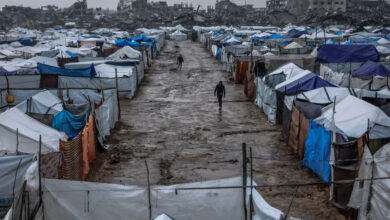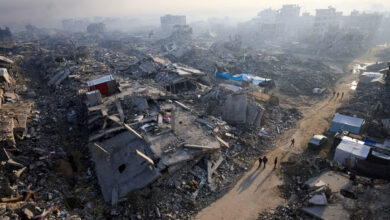Jerusalem–Two Israeli soldiers and a Palestinian civilian were killed Friday as a gunbattle between troops and Palestinian militants widened into some of the fiercest fighting in the Gaza Strip since Israel’s military offensive there last year.
Gaza’s Islamic Hamas rulers confirmed their gunmen were involved in Friday’s violence—marking a shift from the group’s tendency over the past year to avoid confrontation with Israeli forces. Palestinian groups did not confirm the Israeli military’s claim that two militants were killed in the clashes.
The fighting followed a string of recent Palestinian rocket attacks on southern Israel that have ratcheted up tensions along the Israel-Gaza border. It also highlighted some of the challenges the U.S. faces as it struggles to get Israeli-Palestinian peace talks back on track.
Israel’s prime minister dug in his heels on one of the issues in contention Friday, insisting in defiance of U.S. pressure that the Jewish state would continue building in contested east Jerusalem. Benjamin Netanyahu’s uncompromising adherence to long-standing Israeli policy signaled that a grave rift with the U.S. remained wide after his White House visit this week—with stalled Mideast peace talks caught in the middle.
"The prime minister’s position is that there is no change in Israeli policy on Jerusalem," Netanyahu’s office said in a statement.
Israel’s military said its troops crossed into Gaza after they spotted militants planting explosives along the security fence on the border. A gunbattle broke out, leaving two soldiers and two militants dead, the military said.
The soldiers were the first to die in clashes with Gaza militants since Jan. 27, 2009, nine days after Israel’s military offensive in the territory ended, the military said.
Israeli Defense Minister Ehud Barak said Israel would respond if militants escalated their attacks. "We aren’t interested in returning the area to days gone by, but if we have to, we will take action," Barak told Channel 2 TV.
Hamas official Ismail Radwan told Associated Press Television News that the deaths of the soldiers were a "gift" from Hamas to Jerusalem and to Hamas operative Mahmoud al-Mabhouh, who is widely believed to have been slain by Israeli agents in a Dubai hotel in January.
Soldiers also fought another group of militants planting explosives, wounding two of them, the military said.
Further south in Gaza, Israeli forces backed by tanks and helicopter gunships fired into a sparsely populated border area near the city of Khan Younis, Hamas security officials said. Militants responded with mortar fire.
Military spokeswoman Lt. Col. Avital Leibovich described the military action in the area as a routine defensive operation meant to protect southern Israel from militants who attack it with rockets and explosives.
Gaza medical officials reported that one civilian was killed and seven were wounded in the fighting. Militants reported one wounded and one missing.
Hamas, which does not recognize Israel’s right to exist, is shunned by Israel and the U.S. as a terrorist group and is not part of Washington’s troubled peace efforts.
Friction over Israeli construction in east Jerusalem has been the focus of the most recent dispute, derailing U.S.-mediated negotiations between Israelis and Palestinians even before they began.
The Palestinians want the eastern sector of the holy city as the capital of a future state that would include the West Bank and Gaza, and view the expanding Jewish presence in east Jerusalem as a challenge to their claim. Netanyahu claims the entire city for Israel’s eternal capital.
The Israeli leader’s meetings in Washington this week with President Barack Obama and other top U.S. officials did not appear to quell U.S. anger over a major east Jerusalem construction project whose announcement in the middle of a visit by Vice President Joe Biden sparked the worst diplomatic row between the two countries in decades.
Israel’s stance earned Netanyahu a chilly reception at the White House, without the usual trappings accorded an important ally. Netanyahu received a warm public reception from Congress, however, indicating the administration might be limited in how much pressure it can apply. American Jewish backers of Israel are traditionally reliable supporters of the Democratic Party.
Netanyahu sat down with key Israeli Cabinet ministers for five hours Friday to frame a response to Washington’s demands for Israeli peace gestures. His office issued a statement afterward offering no details of the discussion, but saying ministers would meet again soon.
In the Syrian capital of Damascus, tens of thousands of Syrians and Palestinians gathered Friday for a government-orchestrated "march of anger" against Israeli construction in Jerusalem’s eastern sector.
Israel annexed east Jerusalem immediately after capturing it from Jordan during the 1967 Mideast war and does not consider Jewish construction there to be settlement activity. Over the years, it has built a ring of Jewish neighborhoods in east Jerusalem to cement its control there. Some 180,000 Israelis live there.
The international community does not recognize the annexation and equates the Jewish construction there with West Bank settlements.



